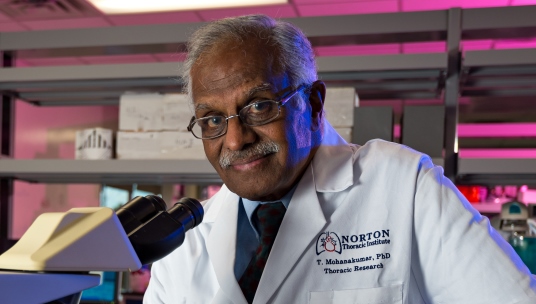On the brink of solving the greatest mystery behind lung transplant rejection

Thalachallour Mohanakumar, PhD, director of the Norton Thoracic Institute Research Laboratory, works every day to solve the mystery of chronic organ rejection, the main factor hindering the long-term success of lung transplantation. He believes a breakthrough is within several years of discovery. Now, with a grant funds totaling more than $2 million over five years from the National Institutes of Health, he is able to push even harder to achieve what what be a seminal milestone in the medical industry. Moreover, it will enhance and extend the lives of countless patients worldwide.
Most patients who receive a lung transplant start experiencing signs of chronic rejection within five years, due to the irreversible process of scarring that deteriorates their transplanted lungs.
Dr. Mohanakumar's research indicates that chronic rejection is caused not only by an alloimmune response, in which the body attacks the transplanted tissue, but more importantly by autoimmune response against tissue-specific substances naturally present in the body.
“We’ve learned a great deal already and there is a strong possibility that we will discover a way to prevent or treat chronic rejection within a few years,” says Dr. Mohanakumar.
“Once the riddle of chronic rejection is solved, we can expect transplanted lungs to last indefinitely,” says Ross Bremner, MD, PhD, executive director of the Norton Thoracic Institute, home of one of the nation's highest performing lung transplant centers. “This is really the ‘holy grail’ of transplantation.”
Support transformative lung transplant research with your gift today!